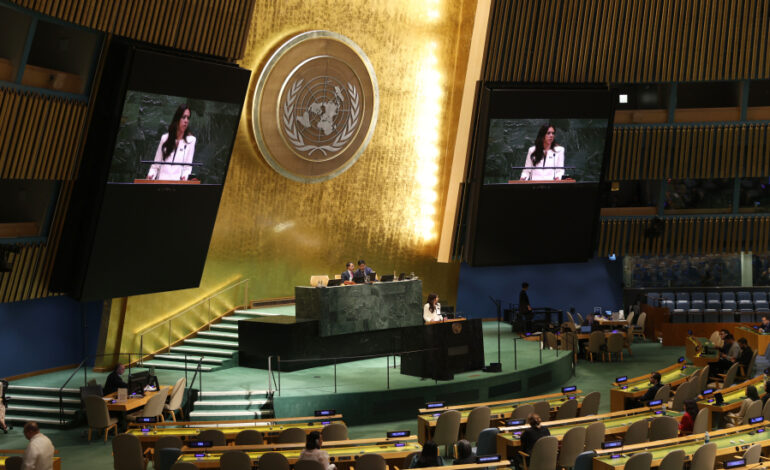Egypt Warns of Mideast Crisis as Leaders Address U.N. Assembly

During the recent annual gathering of world leaders at the United Nations, foreign ministers from Egypt, Saudi Arabia, the United Arab Emirates, and Oman voiced urgent concerns regarding the escalating crisis in the Middle East. Egypt’s Foreign Minister Badr Abdelatty described the region as being “at a point of implosion,” highlighting the dire consequences of ongoing conflicts, particularly the situation in Gaza.
The four nations condemned Israel’s military operations in Gaza, emphasizing the devastating impact on Palestinian civilians. They expressed frustration over the international community’s failure to broker a ceasefire, which has left thousands suffering amid relentless violence. Their remarks came shortly after Israeli Prime Minister Benjamin Netanyahu addressed the General Assembly, asserting that Israel “must finish the job” against Hamas following its surprise attack on October 7, 2023, which resulted in approximately 1,200 deaths in Israel and 250 hostages taken by Hamas.
Calls for Accountability and International Action
In his statements, Minister Abdelatty sharply criticized the global community for its perceived inaction, stating it stands “idly by as a spectator” while international law is violated in Gaza and across the region. He characterized Israel’s military actions as a “wanton, unjust war waged against defenseless civilians for a sin they did not commit,” and he lamented the lack of accountability for these actions.
Abdelatty invoked the legacy of former Egyptian President Anwar Sadat, who made a historic visit to Israel in 1977, marking a significant step toward peace in the region. He emphasized that true security for Israel is unattainable unless other nations in the region are also secure. “The region cannot see stability without an independent state of Palestine,” he argued, underscoring the interrelated nature of these conflicts.
In addition to the situation in Gaza, the ministers highlighted other regional crises. These include the ongoing civil war in Sudan, the need for elections in Libya, and the protracted conflict in Yemen between the internationally recognized government and Houthi rebels. They also pointed to repeated Israeli incursions into Lebanese and Syrian territories as contributing factors to regional instability.
Commitment to Peace Initiatives
Saudi Arabia’s Foreign Minister Prince Faisal bin Farhan joined the call for immediate international action, noting the unprecedented humanitarian crisis in Gaza. He stated that the suffering of the Palestinian people makes it essential for the international community to not only end the war in Gaza but also to pursue lasting peace. “A two-state solution to the nearly 80-year Israeli-Palestinian conflict is the only path that would guarantee the security of all countries in the region,” he asserted.
Prince Faisal warned that the international community’s failure to take decisive action against what he termed “Israeli aggression” would lead to further instability, both regionally and globally. He emphasized that such inaction could exacerbate war crimes and acts of genocide. In response to these challenges, Saudi Arabia, alongside Norway and the European Union, has initiated an international coalition aimed at implementing the two-state solution.
The statements made at the U.N. Assembly reflect a growing concern among regional leaders about the broader implications of the ongoing conflicts in the Middle East. With millions affected and the potential for further escalation, their calls for immediate action resonate beyond the walls of the United Nations, urging a collective response to restore peace and security in a region long plagued by turmoil.






